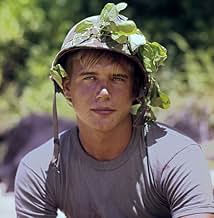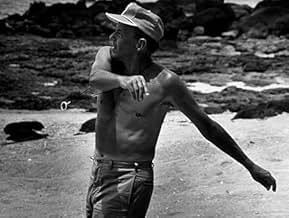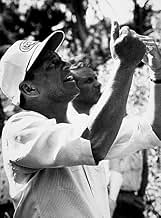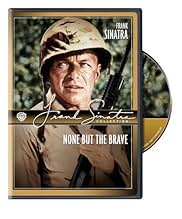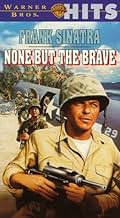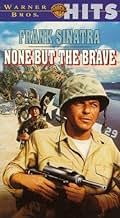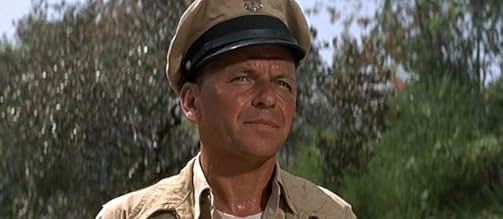IMDb RATING
6.4/10
2.2K
YOUR RATING
During WW2, a platoon of Marines crash-lands on a tiny Pacific island occupied by a small Japanese unit.During WW2, a platoon of Marines crash-lands on a tiny Pacific island occupied by a small Japanese unit.During WW2, a platoon of Marines crash-lands on a tiny Pacific island occupied by a small Japanese unit.
- Director
- Writers
- Stars
Takeshi Katô
- Sgt. Tamura
- (as Takeshi Kato)
Tôru Ibuki
- Pvt. Arikawa
- (as Toru Ibuki)
Ryûchô Shumpûtei
- Pvt. Okuda
- (as Ryucho Shunputei)
- Director
- Writers
- All cast & crew
- Production, box office & more at IMDbPro
Featured reviews
Over in the trivia section of the IMDb there is a submission that reads something like..."When he (Tommy Sands)divorced Frank's kid (her name is Nancy), Sinatra allegedly saw to it that his (Sand's) career went permanently on the rocks"...or something like that. Statements like that should be followed by telling exactly just how this was accomplished. This film, "None But the Brave" may contain the answer. It was directed (none too well at that) by Mr. Sinatra, and Mr. Sands, in every scene he is in and every line he speaks, gives the most shrill, bizarre, over-the-top, irritating,mind-boggling, irksome, get-the-hook, somebody-please-shoot-him performance ever seen in a movie that had a budget of over $1200. He was not good enough as an actor to have been that bad on purpose. He was not good enough of an actor to have been that bad accidentally. Only a director on a mission can take a performer to the depths reached by Tommy Sands in this film. Thanks a lot, Dad.
The title is from John Dryden's poem, "Alexander's Feast", stanza 1: "None but the brave/ deserve the fair" . Sinatra's directorial debut , it results to be an efficient effort , a straightforward and gripping movie , being the first Japanese/American co-production . During WWII , an American bomber aircraft is gunned down and crashes on an island (the plane flown that was shot down was R4D, C47 transport) . American and marooned Japanese soldiers (survivors from a Japanese battalion) are stranded on a tiny Pacific island , in the Salomons , during World War II . But in this uninhabited island in the Pacific Ocean there is one Japanese military group and both of them stranded together . There takes place a physical and psychological battle between American/Japanese with anti-war allegory . After a skirmish , the two bunches initiate a fragile truce with the understanding that fighting will resume if one or the other sends for help . The Japanse detachment (who are mercifully allowed to speak Japanese) is commanded Lt. Kuroki (Tatsuya Mihashi) , as the film being told through the eyes of this Japanese unit commander . The American group is commanded by Capt. Dennis Bourke (Clint Walker) who must deal with an atmosphere of growing distrust and tension between their men . They confront each other in a violent mini-war but then come to terms with each other . . There , they must cease their hostility and unite themselves if they want to survive until a disappointing and unexpected ending . The Marines hold heavy weapons : M1 , Grease gun , carbine and 45 cal pistol against the Japanese rifle and hand grenade . Soonafter , the American attempt to capture a boat laboriously built by the Japanese . The American repair their radio unit ; then , things go wrong and they must decide on their next unsettling actions . This movie's closing end coda states: "Nobody Ever Wins" .
Nice and well executed film set during WWII , containing a brief anti-war declaration . The plot is plain as well as simple and prefigures ¨John Boorman's Hell in Pacific¨ , dealing with a platoon of Marines crash-lands on a tiny Pacific island occupied by a small Japanese unit and must make a temporary truce and cooperate to survive various tribulations . The film has a carefully constructed mood as the two groups warily circle each other and spasmodically clashing in battle , including an anti-war message ingeniously overplayed . However , being stupidly fractured by two inappropriate flashbacks , obviously designed to provide the ordinary love interest . The movie sometimes lapses into tedium and slowness , though contains striking images with moments of great power and adequate scenarios . Here Sinatra gives a very good acting as the sympathetic but drunk doctor . Known as "One-Take Charlie" for his approach to acting that strove for spontaneity and energy, rather than perfection , Sinatra was an instinctive actor who was best at playing parts that mirrored his own personality . The remaining cast is pretty good , such as : the tall Clint Walker who bears the main role , Brad Dexter from Magnificent seven , Tony Bill , Rafer Johnson as Pvt. Johnson , Tommy Sands who co-stars in the movie divorced Nancy Sinatra, Frank Sinatra's daughter , the same year this picture came out and Richard Sinatra , Frank Sinatra's cousin, appears as Private Roth . And special mention for Tatsuya Mihashi as Lt. Kuroki .
This is the first Japanese-American co-production, produced by Kikumaru Okuda for Toho Studios and by Frank Sinatra for Warner Brothers , being professionally directed by Frank who displays great competence as an action filmmaker with some scenes that are decently choreographed and memorable fight shots of both sides when they destroy their means of getaway . Frank Sinatra's only film as director and his 6th out of nine films as producer , though he also made 2 episodes ,¨The Frank Sinatra Show¨ TV Series . Sinatra's biggest hit was his role as Maggio in From Here to eternity (1953) . He won an Oscar for best supporting actor and followed this with a scintillating performance as a cold-blooded assassin hired to kill the US President in Suddenly (1954). Arguably a career-best performance , garnering him an Academy Award nomination for Best Actor , was his role as a pathetic heroin addict in the powerful drama The man with the Golden arm (1955). He continued to give strong and memorable performances in such films as Guys and dolls (1955) and Some come running (1958). In the late 1950s and 1960s Sinatra became somewhat prolific as a producer, turning out such films as A hole in the head (1959) , Sergeant 3 (1962) and the very successful Robin and 7 Hoods (1964). Lighter roles alongside "Rat Pack" buddies Dean Martin and Sammy Davis Jr. were lucrative, especially the famed Ocean's eleven (1960). On the other hand, he alternated such projects with much more serious offerings, such as The Manchurian Candidate (1962), regarded by many critics as Sinatra's finest picture . That same year Von Ryan (1965) was a box office sensation . In 1967 Sinatra returned to familiar territory in Sidney J. Furie's The naked runner (1967) , once again playing masterfully in his only film to be shot in the U.K. and Germany . That same year he starred as a private investigator in Tony Rome (1967), a role he reprised in the sequel , Lady in cement (1968). He also starred with Lee Remick in The detective (1968), a film daring for its time with its engaging theme and it was a major box-office success.
Nice and well executed film set during WWII , containing a brief anti-war declaration . The plot is plain as well as simple and prefigures ¨John Boorman's Hell in Pacific¨ , dealing with a platoon of Marines crash-lands on a tiny Pacific island occupied by a small Japanese unit and must make a temporary truce and cooperate to survive various tribulations . The film has a carefully constructed mood as the two groups warily circle each other and spasmodically clashing in battle , including an anti-war message ingeniously overplayed . However , being stupidly fractured by two inappropriate flashbacks , obviously designed to provide the ordinary love interest . The movie sometimes lapses into tedium and slowness , though contains striking images with moments of great power and adequate scenarios . Here Sinatra gives a very good acting as the sympathetic but drunk doctor . Known as "One-Take Charlie" for his approach to acting that strove for spontaneity and energy, rather than perfection , Sinatra was an instinctive actor who was best at playing parts that mirrored his own personality . The remaining cast is pretty good , such as : the tall Clint Walker who bears the main role , Brad Dexter from Magnificent seven , Tony Bill , Rafer Johnson as Pvt. Johnson , Tommy Sands who co-stars in the movie divorced Nancy Sinatra, Frank Sinatra's daughter , the same year this picture came out and Richard Sinatra , Frank Sinatra's cousin, appears as Private Roth . And special mention for Tatsuya Mihashi as Lt. Kuroki .
This is the first Japanese-American co-production, produced by Kikumaru Okuda for Toho Studios and by Frank Sinatra for Warner Brothers , being professionally directed by Frank who displays great competence as an action filmmaker with some scenes that are decently choreographed and memorable fight shots of both sides when they destroy their means of getaway . Frank Sinatra's only film as director and his 6th out of nine films as producer , though he also made 2 episodes ,¨The Frank Sinatra Show¨ TV Series . Sinatra's biggest hit was his role as Maggio in From Here to eternity (1953) . He won an Oscar for best supporting actor and followed this with a scintillating performance as a cold-blooded assassin hired to kill the US President in Suddenly (1954). Arguably a career-best performance , garnering him an Academy Award nomination for Best Actor , was his role as a pathetic heroin addict in the powerful drama The man with the Golden arm (1955). He continued to give strong and memorable performances in such films as Guys and dolls (1955) and Some come running (1958). In the late 1950s and 1960s Sinatra became somewhat prolific as a producer, turning out such films as A hole in the head (1959) , Sergeant 3 (1962) and the very successful Robin and 7 Hoods (1964). Lighter roles alongside "Rat Pack" buddies Dean Martin and Sammy Davis Jr. were lucrative, especially the famed Ocean's eleven (1960). On the other hand, he alternated such projects with much more serious offerings, such as The Manchurian Candidate (1962), regarded by many critics as Sinatra's finest picture . That same year Von Ryan (1965) was a box office sensation . In 1967 Sinatra returned to familiar territory in Sidney J. Furie's The naked runner (1967) , once again playing masterfully in his only film to be shot in the U.K. and Germany . That same year he starred as a private investigator in Tony Rome (1967), a role he reprised in the sequel , Lady in cement (1968). He also starred with Lee Remick in The detective (1968), a film daring for its time with its engaging theme and it was a major box-office success.
On a tiny forgotten island in the Pacific, there a tiny and forgotten Japanese outpost--with men who'd become stuck there with no great hope of rescue. Into this tiny place arrives a crashing airplane filled with US Marines. When they land, hostilities naturally break out between the groups. However, after a while they realize that killing each other will solve nothing and they have to work together to survive--forging an uneasy peace and friendship between enemy combatants.
NONE BUT THE BRAVE is a film that is a real product of the times. Had anyone wanted to make such a film in the 1940s, they might just have been strung up for the film's very unusual sensibilities. Unlike older war films, in this one the Japanese are humanized a great deal and it's obvious that the film was made during the anti-war 60s (though early in the anti-war years). In many ways, this is a good thing--showing that people on both sides could be decent. Though in some ways the whole thing seemed a bit hard to believe--after all, very, very few Japanese officers would have admitted to not having faith in the war--this was a very 1960s sentiment.
As for the acting, it was generally good. Clint Walker was clearly the star, though Frank Sinatra had a decent co-starring role in this film that he both produced and directed. The Japanese actors also were pretty good. The only weak point was the way Tommy Sands' character was written--he was like a one-dimensional caricature instead of a real soldier. No young lieutenant is THAT obnoxious and stupid!!
Overall, an entertaining film but one that strains credibility, as the concept behind the film just doesn't make much sense for the 1940s. Still, if you can stop those voices in your head from complaining about the plot, it's a good and very different movie.
NONE BUT THE BRAVE is a film that is a real product of the times. Had anyone wanted to make such a film in the 1940s, they might just have been strung up for the film's very unusual sensibilities. Unlike older war films, in this one the Japanese are humanized a great deal and it's obvious that the film was made during the anti-war 60s (though early in the anti-war years). In many ways, this is a good thing--showing that people on both sides could be decent. Though in some ways the whole thing seemed a bit hard to believe--after all, very, very few Japanese officers would have admitted to not having faith in the war--this was a very 1960s sentiment.
As for the acting, it was generally good. Clint Walker was clearly the star, though Frank Sinatra had a decent co-starring role in this film that he both produced and directed. The Japanese actors also were pretty good. The only weak point was the way Tommy Sands' character was written--he was like a one-dimensional caricature instead of a real soldier. No young lieutenant is THAT obnoxious and stupid!!
Overall, an entertaining film but one that strains credibility, as the concept behind the film just doesn't make much sense for the 1940s. Still, if you can stop those voices in your head from complaining about the plot, it's a good and very different movie.
A plane load of US Marines crashlands on a Pacific Island held by Japanese soldiers during WW2. The Marines include a green lieutenant (Sands), a veteran sergeant (Dexter) and a medic (Sinatra). Clint Walker plays the pilot who is more than just a pilot.
The Japanese have been bypassed by their own and are seeking a way off the island. There are a few skirmishes with the Marines and then a "truce".
But how long will it hold for?
Good characters, story and actors make it worth watching.
The Japanese have been bypassed by their own and are seeking a way off the island. There are a few skirmishes with the Marines and then a "truce".
But how long will it hold for?
Good characters, story and actors make it worth watching.
There's a clumsiness to 1965's "None But The Brave" that you really shouldn't let get in your way of the film. The clumsiness is due to Frank Sinatra's direction -- he was a far, far better actor than a director, and wisely chose never to direct another film -- and it exposes itself most prominently in the film's heavy-handed "flashback" sequences.
Having gotten that out of the way, let's consider the film itself. World War II, a small island in the Pacific: a group of marooned GIs find themselves sharing space with an equally marooned group of Japanese soldiers. Reluctantly, a truce evolves; each side has something the other needs. During that truce, enemies develop -- if not a true friendship -- at least an understanding, an empathy, and a respect for, each other. This truce, of course, cannot endure. The outside world -- and the war -- must impose itself, and each side reacts according to its own sense of honor and duty. Rightly so.
Some reviewers have chosen to label this an 'anti-war' film. Perhaps it is. Myself, I prefer to think of it, rather, as a 'pro-humanity' film, one which recognizes that man will pit himself against man time and time again, and for reasons that may or may not be the best, but that -- in the end -- we can, each of us, even in the midst of the most horrific conflict imaginable, step away, even if only for the briefest of moments (or truces), and deal with each other as human beings.
That's what happens in "None But The Brave."
And if the ending is less than satisfactory, maybe it serves to makes us each wish for a better one . . . and a better world!
Having gotten that out of the way, let's consider the film itself. World War II, a small island in the Pacific: a group of marooned GIs find themselves sharing space with an equally marooned group of Japanese soldiers. Reluctantly, a truce evolves; each side has something the other needs. During that truce, enemies develop -- if not a true friendship -- at least an understanding, an empathy, and a respect for, each other. This truce, of course, cannot endure. The outside world -- and the war -- must impose itself, and each side reacts according to its own sense of honor and duty. Rightly so.
Some reviewers have chosen to label this an 'anti-war' film. Perhaps it is. Myself, I prefer to think of it, rather, as a 'pro-humanity' film, one which recognizes that man will pit himself against man time and time again, and for reasons that may or may not be the best, but that -- in the end -- we can, each of us, even in the midst of the most horrific conflict imaginable, step away, even if only for the briefest of moments (or truces), and deal with each other as human beings.
That's what happens in "None But The Brave."
And if the ending is less than satisfactory, maybe it serves to makes us each wish for a better one . . . and a better world!
Did you know
- TriviaDuring downtime whilst shooting the picture, Brad Dexter saved Frank Sinatra from drowning when he dived into the ocean and rescued the floundering singer.
- GoofsOne African American belongs to the USMC platoon. At this time, US military was not an integrated military and Blacks were segregated. This black Marine couldn't have been a member of this platoon. The USMC was integrated in World War II, as according to the Marine hierarchy, "There is only one color in the USMC, Marine Corps green."
- Quotes
Lt. Kuroki: Our island is a little chunk of coral in the Sakhalin archipelago. It is nameless and the Great War beyond its horizons ignores us, for we are the expendables of an amphibious landing, left to God, a forgotten outpost of the Imperial Japanese Army.
- Crazy creditsThe line NOBODY EVER WINS appears in place of "The End" just before the end credits start, which is appropriate given the film's anti-war message.
- Alternate versionsSome prints of the film do not include subtitles for any of the Japanese sequences.
- ConnectionsFeatured in Stars of the Silver Screen: Frank Sinatra (2011)
Details
- Runtime1 hour 46 minutes
- Aspect ratio
- 2.35 : 1
Contribute to this page
Suggest an edit or add missing content




